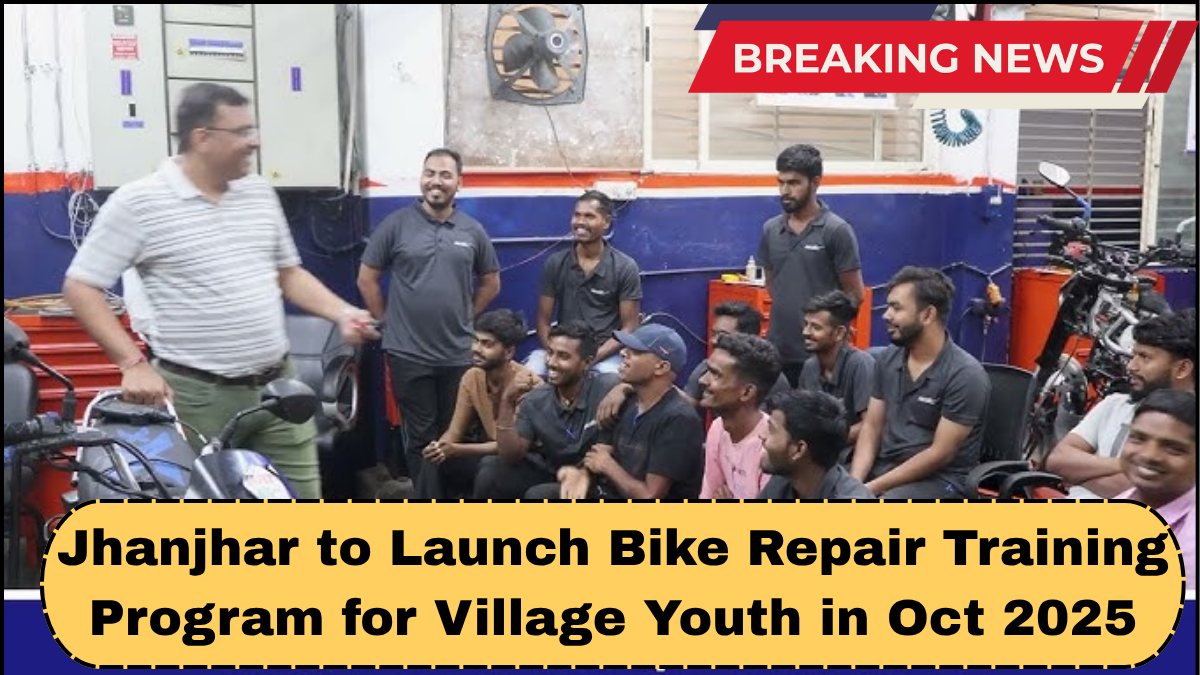In a decisive step toward empowering rural communities, Jhanjhar is set to launch a Bike Repair Skill Program in October 2025 aimed specifically at village-level youth training. The initiative is part of a broader movement to foster local employment, reduce migration, and provide sustainable livelihood opportunities to young individuals residing in underdeveloped and semi-urban areas.

Empowering Rural Youth Through Practical Skills
The Bike Repair Skill Program will be open to youth between the ages of 18 and 30 residing in villages across the Jhanjhar district. With the ever-growing number of two-wheelers in rural and semi-rural areas, the demand for skilled mechanics has surged. Recognizing this gap, the program is structured to deliver hands-on mechanical training with a strong focus on employability and self-reliance.
Participants will be trained in a wide array of repair skills, including engine diagnostics, brake and suspension maintenance, fuel system repairs, electrical troubleshooting, and customer service. The course will also include safety protocols, tool handling, and small business management for those who wish to launch their own garages after completion.
Government and NGO Collaboration
This youth training initiative is being launched in collaboration with local NGOs and supported by the state government’s rural development department. Training centers will be set up at various village clusters to make the program accessible to all interested candidates without requiring travel to distant towns.
Instructors will include certified mechanics, vocational trainers, and industry professionals. The curriculum is being developed with guidance from technical education boards to ensure alignment with industry standards and certifications. Graduates of the program will receive recognized skill development certificates, enhancing their chances of employment in both rural and urban job markets.
Economic and Social Impact
This bike repair skill program is not only a step toward technical empowerment but also a strategic move to stimulate local economies. By training youth to become self-sufficient mechanics, the initiative will help reduce unemployment and dependence on seasonal agriculture or unskilled labor. Young people can either join existing repair shops or start small-scale businesses within their own villages, contributing to the local economy while staying close to home.
Moreover, the initiative is expected to reduce the cost and downtime associated with transporting vehicles to distant towns for repairs. With trained professionals available at the village level, vehicle owners can access affordable and timely services locally.
Promoting Gender Inclusion and Digital Access
While traditionally seen as a male-dominated trade, the program is open to women as well. Special outreach campaigns are being planned to encourage the participation of young women interested in mechanical work. In addition, the training centers will integrate digital modules to ensure that participants become familiar with modern diagnostic tools and software used in contemporary bike repair.
Online learning platforms and mobile apps will supplement classroom training, allowing students to revise lessons, view tutorials, and even take mock tests on their phones—bridging the digital divide one lesson at a time.
A Model for Scalable Rural Training
If successful, the Jhanjhar youth training village-level initiative could become a model for similar programs across the country. By focusing on a skill that has immediate local demand, the project demonstrates a practical and scalable approach to rural development. Plans are already in motion to assess outcomes within six months of the program’s launch, with the goal of expanding into other districts by mid-2026.
Frequently Asked Questions (FAQ)
Q1: Who can enroll in the bike repair skill program?
A: Youth aged 18–30 from Jhanjhar villages are eligible. Priority may be given to school dropouts and unemployed individuals.
Q2: Is there any fee for the program?
A: The training is being offered free of cost, with support from local NGOs and government funds.
Q3: What is the duration of the program?
A: The course will run for 3 months, including both theory and practical sessions.
Q4: Will participants receive certification?
A: Yes, upon successful completion, participants will receive a government-recognized skill development certificate.
Q5: Can women join this training?
A: Absolutely. The program encourages gender inclusion and welcomes female applicants.
Q6: Will the training help in starting a business?
A: Yes, the curriculum includes basic entrepreneurial skills, and participants will be guided on how to set up their own repair units.
click here to learn more